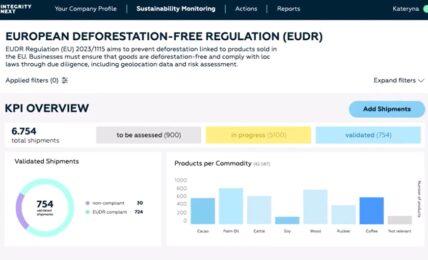The IFRS Foundation and the Global Reporting Initiative (GRI) announced today an expanded collaboration aimed at optimizing how their respective sustainability reporting standards can be used together.
The announcement builds on an initial collaboration agreement between the organizations launched in 2022, aimed at ensuring compatibility and interconnectedness of sustainability-related disclosures, in order to help reduce the reporting burden on companies complying with the multiple standards that were in place or under development, and to help harmonize sustainability reporting systems internationally.
Erkki Liikanen, Chair of the IFRS Foundation Trustees, said:
“In March 2022, the IFRS Foundation Trustees signed a Memorandum of Understanding with GRI in recognition of the importance of ensuring compatibility and interconnectedness between our respective standards to benefit report preparers and users around the world. The IFRS Foundation Trustees believe today’s agreement solidifies and advances that MoU so that together we can reduce duplication, fragmentation and complexity in the sustainability disclosure landscape.”
The IFRS Foundation’s International Sustainability Standards Board (ISSB) was launched in November 2021 at the COP26 climate conference, with the goal to develop IFRS Sustainability Disclosure Standards to provide investors with information about companies’ sustainability risks and opp’ortunities. The IFRS released the inaugural general sustainability (IFRS S1) and climate (IFRS S2) reporting standards in June 2023, and in July, IOSCO, the leading international policy forum and standards setter for securities regulators called on regulators to incorporate the standards into their sustainability reporting regulatory frameworks.
The ISSB recently announced plans to launch new projects researching corporate disclosure on risks and opportunities in key sustainability-related areas including biodiversity, ecosystems and ecosystem services, and human capital, aimed at informing its work on future sustainability reporting standard setting.
GRI Sustainability Reporting Standards are one of the most commonly accepted global standards for sustainability reporting by companies, developed to enable consistent reporting across companies and industries, providing clearer communication regarding sustainability matters to a broad range of stakeholders, including investors. The GRI published a major update of the standards in 2021, and recently published a new biodiversity reporting standard, aimed at enabling companies to publicly disclose on their most significant biodiversity impacts, and how they are managed. The GRI’s standards are developed by the Global Sustainability Standards Board (GSSB).
According to the IFRS Foundation and the GRI, the expanded collaboration looks to “provide a seamless, global and comprehensive sustainability reporting system for companies looking to meet the information needs of both investors and a broader range of stakeholders.”
Under the new agreement, the organizations said that the ISSB and GSSB will work together to identify and align common disclosures, with an initial methodology pilot building on the GRI’s new biodiversity standard, and the ISSB’s recently announced project on Biodiversity, Ecosystems and Ecosystem Services.
Carol Adams, Chair of the GSSB, said:
“This new agreement recognises our commitment to enhancing disclosures on an organisation’s most significant impacts, as well as their sustainability-related risks and opportunities. The next stage, starting with biodiversity, builds momentum towards a fully aligned global standards system. We believe reporters and stakeholders, including investors, will welcome this step.”
The organizations added that they will continue to make decisions separately, and each will continue to focus on their respective objectives, with the ISSB targeting the information needs of investors, and the GSSB focused on the needs of a broad range of stakeholders.
ISSB Chair Emmanuel Faber said:
“The ISSB’s focus continues to be on meeting the information needs of capital markets. Through this collaboration companies that wish to apply both the ISSB and GRI Standards to facilitate reporting to a broader range of stakeholders will be able to do so in a seamless way. My thanks to GRI and the GSSB for their ongoing partnership.”
Eelco van der Enden, CEO of GRI, added:
“From the outset, our collaboration with the IFRS Foundation has been built on a desire to ensure that GRI and ISSB standards can be used seamlessly together so that sustainability reporting is streamlined and robust. The announcement today marks an important step towards making that a reality.”

